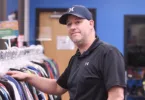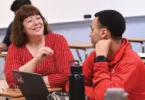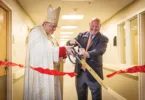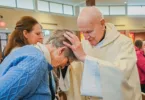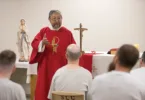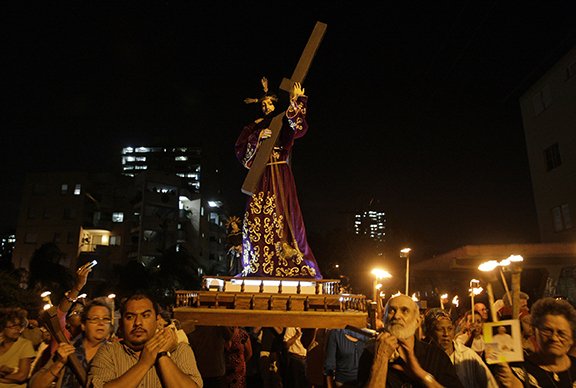
People take part in an outdoor Stations of the Cross procession in Havana March 7. Cuba’s government, after a request from Pope Benedict XVI, declared Good Friday 2012 a national holiday.
by Jill Ragar Esfeld
Special to the Leaven
“The first thing I’ll tell you is everything I thought I understood about Cuba is thrown out the window.”
Sean Reilly, basketball coach and Catholic outreach director at St. Thomas Aquinas High School in Overland Park, was reflecting on a recent fact-finding tour of Cuba.
His purpose was to evaluate the island as a mission trip destination for students. What he found was a great need — but it wasn’t the one he expected.
“We came down here looking for projects we could build,” he said. “And we were way off base.
“The project is people who needed to know other Catholics haven’t forgotten them.”
Faith revival
After almost 50 years of being officially termed an atheist nation, Cuba is returning to its origin of deep religious ties.
Before the historic visit of Pope John Paul II in 1998, the word “atheist” was replaced with “secular” in Cuba’s constitution, and the government allowed citizens to celebrate Christmas for the first time in decades.
This shift toward increased religious freedom continued and, last March when Pope Benedict visited Cuba, he saw overwhelming crowds at two outdoor Masses.
“Since his visit, there’s been a greater interest in religious practices and expression,” said Reilly.
Cuba is in the midst of a spiritual reawakening, and 60 percent of its 11 million people have roots in Catholicism. However, as Reilly discovered, the Catholic Church has been slow to respond to this clear need for evangelization in Cuba.
“All the Christian churches are growing,” he said. “That’s one of the things that shocked me.
“They have so many people representing different [Protestant] congregations working there, and the evangelicals and Pentecostals have exploded.
“The ministers are all extremely eloquent, and they’re giving an outpouring of their faith; but it’s not Catholicism.”
Serena Price, who runs the Spirit Shop at St. Thomas Aquinas and has accompanied Reilly on many student mission trips, was with him in Cuba.
“The little town we were in,” she said, “it’s about two hours from Havana. They had never had a group of Catholics visit.”
Lost generations
As the Catholic Church reawakens in Cuba, it’s finding a young generation of believers with big questions and no one to answer them.
To illustrate this point, Reilly recalled a local Mass they attended. The front of the church was filled with Catholic adults older than 60.
“They remember,” he said.
The rest of the church was filled with young adults, teens and children
“They’re curious,” he said.
The middle-aged groups were missing. The decades when religion wasn’t openly practiced in Cuba left this gap.
“So there is this lost hole in the Catholic Church there,” said Reilly. “There are no adults to be mentors to the youth.”
“Two generations didn’t grow up with prayers at home and going to Mass,” added Price. “It wasn’t even available.”
Reilly recalled going to another Mass with three Columbian Sisters and a Cuban priest.
“When we walked into this church, you would have thought we were bishops and cardinals,” he said. “The people were hugging us, thanking us for coming to be with them.
“And Father told me, ‘These people know now that they’re not alone. There are Catholics in other parts of the world that care about them.’”
Reaching out to youth
The youth are the hope for the future Catholic Church in Cuba, but they desperately need evangelization. The concepts American Catholics have grown up understanding, like the Trinity, are completely unknown to them.
“So I started telling them about Saint Patricio,” said Reilly. “You could see Father was beaming with pride.”
The Sisters told Price children and teenagers don’t even know how to bless themselves. They begged her to come back soon and teach them.
“Please come to our Catholic families,” Price recalled them saying. “Tell them how to be Catholic, tell them how to have prayers in their home, how to have faith and hope in Christ.”
There is a clear opportunity to evangelize the Cuban youth, who are starving for information, and through them, spread Catholic teaching, said Price.
“So our hope is with the younger crowds desiring to know God more, enlightening them would also be enlightening to the rest of the family,” said Price.
Though the need for Catholic teaching in Cuba is overwhelming, Reilly and Price agreed it was not a job for high school students. Their fact-finding mission had to turn down a different path.
“High school students need to be kept busy,” explained Reilly. “That’s the stage of development they’re in.
“[Cuba] doesn’t need us to build homes and hospitals and orphanages and churches, like other countries do. They need us to build Catholic relationships.
“So we learned very quickly that this would be more of a young adult/adult opportunity.”
One plan, then another
After returning to the States and spending long days thinking, praying and networking, Reilly decided the need in Cuba is so immediate they had to plan a mission trip there as soon as possible.
But the need is so great, he knew he also had to plan a more expansive mission trip for the future.
The first mission trip will take place this coming spring.
“The plan is to bring a group of like-minded Catholics from our archdiocese, hopefully bilingual, to meet the partners we already have in place in parishes in Cuba,” explained Reilly. “We’ll work with the priest and nuns there in their ministry, to help them evangelize.”
The second trip date is still up in the air, but it promises to be as engaging as it is unique. Reilly is putting together a combined sports clinic and youth ministry mission.
“That all comes out of Pope John Paul wanting to reach young people through activities and sports,” he said. “So it’s not a novel idea on our part — it’s a metamorphosis of what John Paul started.
“But it has never been done in Cuba.”
And plans seem to be falling in place. Reilly was recently driving his daughter to soccer practice when he got a welcome call on his cellphone.
“It was Coach [Frank] Martin on the phone saying, ‘Tell me all about Cuba,’” recalled Reilly. “I’m driving my daughter to soccer practice and he says, ‘I want to be involved.’”
Martin, recently of Kansas State and now head coach at the University of South Carolina, is not only a renowned coach, but also a Cuban Catholic who speaks the language fluently.
“So I said, ‘Frank, they’ve talked to me about the potential of putting on a basketball clinic — would you like to be involved with that?’
“And he said, ‘Sign me up!’”
Luring them in
Reilly has experience putting on sports clinics in Guatemala, at the San Lucas mission there.
“So it’s not like it’s the first time I’ve done something like that in a Latin American country,” he said.
The sports clinic will take place in Havana.
“In the afternoon, the kids will do sports, and we’ll use that as a lure,” explained Reilly. “After that, we’ll have youth groups in Catholicism.”
Reilly is also trying to involve Catholic Athletes for Christ, which has an evangelization wing in baseball and soccer.
“And a Catholic mission group out of Dallas that is bilingual, is interested in doing the ministering part to the youth,” he said.
All Reilly needs now is more volunteers to help him bring these missions to life and spread the word about the need for Catholic evangelization in Cuba. (See sidebar.)
“If I can inform other members of the archdiocese,” he said, “maybe I could be a conduit for people who want to evangelize there.
“For some reason I’ve been presented this opportunity, and the best I can do is try to inform more people that this could be a spiritual venture of reaching out to an under-served Catholic population.”

